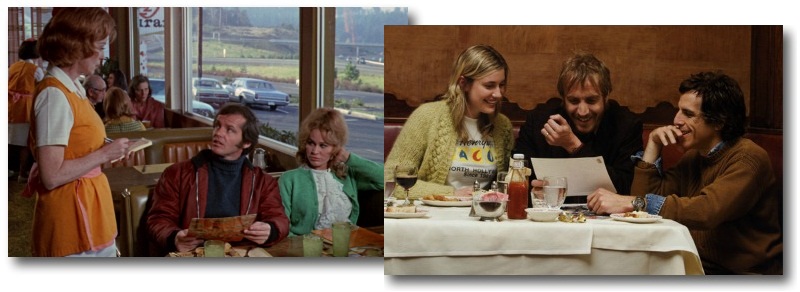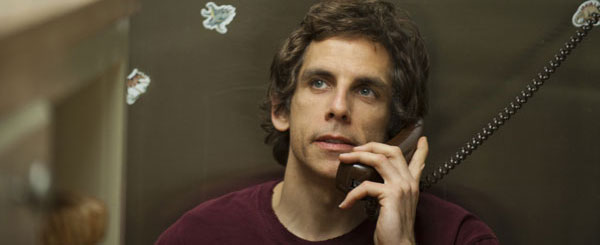Robert here with Distant Relatives, which explores the connections between one classic and one contemporary film.

Growing up is Hard to Do
Hollywood has always been interested in man-children, and they've gone through a variety of manifestations through the years. During the silent era they were innocent clowns filled with the insecurities and curiosities of children. During the age of the screwball comedy they were flailing baffoons unable to compete with their strong professional female counterparts. In the 1950's they were dark brooding rebels looking for causes and that lead the way to the serious sixties, where young men were similarly angry (though lighter on the melodrama, heaver on the realism) painted as victims of a combination of social indifference and their own unambitions. Though if you called them "victims" to their faces, they'd probably punch yours. This contingent was fronted from Britian by the likes of Finney and Harris but soon found plenty of eager representatives in the US, not the least of whom was snide, sarcastic, and so-damn-cool Jack Nicholson. In Five Easy Pieces, Nicholson plays Bobby Dupea, a man meandering through life, trailed by the shadow of his lost potential, trying to understand who he is as adulthood passes him by.
Almost forty years later, Ben Stiller, a man who has made his living playing the goofiest kind of man-child plays the dark and cynical Roger Greenberg, a man also trying to figure out his life in the face of shattered potential. He has a lot in common with Bobby Dupea. In both cases, the impetus for our characters' confrontations with their immaturities comes in the form of a move. But while they're both going west, they're actually heading in two different directions. Bobby is going to his family's house in Seattle, where his person will be juxtaposed against their culture and civility. Even if we want Bobby to get his act together and take his place in the world of his family, we feel as out of place there as he does. Roger meanwhile has just moved to Los Angeles where his cynicism is juxtaposed against an even greater immaturity; immaturity as an accepted state of Nirvana. He asks while at a child's birthday party "Why are all the grown men dressed like kids and all the kids dressed like super heroes?" It's a beautiful symbol for a world in which dreaming for great power and great responsibility evolveds into longing for no power and no responsibility.

As much as a misanthrope as Greenberg is, we feel for him at times, if only because we get to experience the horrors of L.A. through him. [more after the jump] We don't have to like him to recognize the mutually shared pain the film puts us through. When he writes endless complaint letters to successful companies like Starbucks, we can understand that this is the best he can do to fight against a world that has disappointed him; passively fight back, mostly take it. Bobby Dupea has every intention of actively fighting back but with as little success. In the film's most famous scene he rages against a waitress who can't provide him with toast even though the restaurant is in possession of bread and a toaster. It's a scene that has come to represent the 60's and 70's counter-culture movement and every small annoyance in a society that could work to benefit you but refuses to do so time and time again. Bobby could have ordered something else and saved himself the stress. Where's the line between acceptance and submission? Is it any different than Greenberg's endless complaint letters? Is he still fighting the good fight too?
Men Out of Place in the World
As angry at the world as they are, and as out of place as they are in the societies that have bred them, Bobby Dupea and Roger Greenberg's true colors show when juxtaposed against the peoples in which they place themselves. Dupea picks up a couple of cynical hitchhikers on his trip home. Disenchanted and angry at the world just as he is, they should get along fine. But Bobby grows weary of them (as do we). He's not at home here. His maturity, by comparison, can't help but show whether he wants it or not. Roger too, when surrounded by reckless youth, a party, the developmentally arrested state out of which he supposedly never grew, finds himself the only one caring about keeping the house clean, sane and out of total chaos. He can't help it either.

Along the way both meet women who help them come to the realization that, like it or not, they are adults. For Roger it's the young, flighty, sincere Florence (Greta Gerwig), for Bobby is the pretty and cultured Catherine (Susan Anspach). Perhaps it's an old narrative trope that a woman can change a man, but in these specific cases it helps that these women don't know their men particularly well and that they can see something in them that most have given up on long ago: possibilities. Whether these relationships last is anyone's guess (and many would guess "no") and whether either man accepts this life he never planned, as one of Roger's friends defines contentment, is unknown either. Still, I've heard it hypotheized that maturity is when that which think you want actually matches up to that which is actually good for you. Whatever is to become of Bobby Dupea and Roger Greenberg, we sense they've crossed that barrier. Regardless of age, or how long it took them to get there, they're now grown up.
Other Cinematic Relatives: Man's Castle (1933), Billy Liar (1963), The Graduate (1967), As Good as it Gets (1997), High Fidelity (2000)